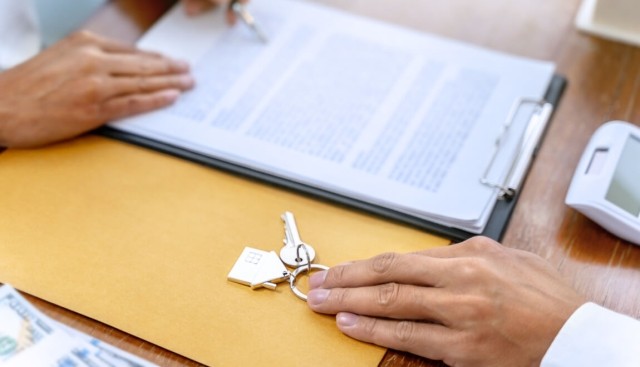Navigating the emotional turmoil of a breakup is challenging enough, but when you share a living space, the situation is even more complicated. Finding yourself on a lease with someone you've just ended things with forces you into a uniquely delicate balancing act between personal well-being and legal obligations. Here are some practical tips for handling the tricky terrain of a housing change after a breakup when you’re both on the lease.
Understanding Your Lease Agreement
Before taking any drastic steps, it's imperative to review your lease agreement thoroughly. This document is your roadmap through the complexities of managing a shared living situation after a breakup.
-
Clarity is key: Familiarize yourself with the specific terms and conditions regarding early lease termination or the possibility of subletting your apartment. This knowledge will not only empower you to make informed decisions but will also help in discussions with your landlord or management company.
-
Legal implications: It's equally important to be cognizant of the legal obligations you and your former partner are under. Breaking a lease can come with significant financial penalties and, in some cases, legal repercussions. Understanding the consequences of breaking your lease in advance can guide you toward the most viable solution, whether that means riding out the lease term or finding a legally sound way to move on sooner.
Communication Is Key
While the situation may be difficult, communication is key, especially when dealing with shared living arrangements. It's essential to have open and honest conversations with your former partner about the lease situation. If possible, try to come to a mutual agreement that benefits both of you. Below are some conversations you and your former partner need to have about the living situation.
Deciding who stays and who goes
Even if things are ending on a bad note, you’ll need to hash everything out. You’ve got to figure the living situation out and plan the next steps for moving forward. The easiest question to answer is whether or not one of you wants to stay. Below are some tips on how to handle who stays and who goes:
- If one person decides to stay, the individual staying (whether that’s you or your former partner) may need to find a new roommate to assist with the rent. Both you and your former partner should find a new roommate, together. This can lessen the financial burden and reduce tension between you both.
- If neither of you wants to stay, see if subletting is an option. Some properties allow it, while others have zero tolerance for subletting. In such a case, you may have to negotiate with your landlord or management company.
- If you both want to stay, the person who was living there first should get to keep the apartment. This may seem harsh, but it’s the practical approach. The other person will have to move out and find a new place.
- Keep the conversation civil and productive. The situation will be hard enough as it is, and fighting will do nothing but slow down the process of moving on. Remember to be respectful of each other's feelings and try to come to a mutually beneficial solution.
- Set a move-out date. This will ensure that the process isn’t delayed any longer than it needs to be.
- Consider looking for a cheap month-to-month apartment while one or both of you look for a more permanent place and share the cost of the extra temp apartment.
- As soon as you get things figured out, let your landlord or property manager know about the situation and begin the process of getting all the paperwork and logistics lined up. Keeping them in the loop will also help avoid any potential legal issues.
Whether staying, leaving, or finding a temporary solution, the key is to approach the situation with respect, civility, and a focus on mutual benefit. By setting clear plans, including a move-out date, and keeping all relevant parties informed, you can minimize stress and ensure a smoother transition for everyone involved.
Sticking it out for the short-term
If you only have a month or two left on your lease, it may be best to stay put for the short term. That way, you won’t have to suffer the repercussions of breaking a lease, which could make it difficult to find a new apartment. Plus, this will give you both time to find a place and move out without feeling pressure to get it done right away. Below are some tips on how to live with your former partner after you have broken up:
- Explore the possibility of staying with friends or family members until the lease ends.
- If needed, plan to switch out staying with others while one of you stays in the apartment.
- Readjust your schedules so that you don’t have to see each other as often and you each have alone time at the apartment.
- Create a private space for each person. Designate certain areas of the apartment as off-limits to one person while the other is there. This will help create boundaries and minimize any confrontations or arguments.
- Respect each other’s privacy and personal space during this time.
- Definitely do not bring a date back to the apartment. It may seem like a good idea at the time, but it could lead to unnecessary drama and hurt feelings.
- Keep your emotions in check. It may be easy to fall back into the couple's routine, but this will only confuse things. Remember, you’re broken up for a reason.
- Lay out the boundaries for interaction, household chores and using shared spaces. Remember, you’re roommates now, not in a relationship. Respect each other’s boundaries and agreements to make the living situation as comfortable as possible.
By thoughtfully planning your living arrangements and interactions, you can minimize stress and discomfort for both parties. Remember, this period is temporary, and with patience and understanding, you can move forward more smoothly.
Handling financial matters
One of the most difficult things to deal with is the financial consequences of breaking up with someone you live with. It’s easy to say that the biggest breadwinner should cover more of the cost, or the person who caused the breakup should pay for everything, but that’s just not fair. Below are some tips on how to handle finances during a breakup where you and your former partner lived together:
- Moving out doesn’t remove responsibility. You’ll both still be responsible for the rent no matter where you live. So regardless of who leaves, make sure the person staying can afford to cover rent or as stated earlier, make arrangements for a new roommate.
- Decide who will cover the cost of any potential early lease termination fees. If you both decide to leave, split the cost equally. If you both plan to move out of the apartment and you have to break the lease, you’ll likely lose the security deposit. If you both paid half, then there’s no problem. But if one person paid the entire deposit, the other person should reimburse them half of what was lost.
- Absolutely do not leave the other person hanging. Even if money is tight there are real credit issues that can result from failing to make payments.
- Make sure all the utilities, cable, and Wi-Fi bills are paid before the move. This will help avoid any lingering financial obligations or disputes.
- If needed, hire a mediator to handle issues that you can’t settle on your own. A mediator is trained to help keep the conversation civil and focused on finding a solution that works for both parties.
- Discuss the situation with your landlord to see if there is any way they can help lessen the financial blow, like refunding the security deposit if you help them find new tenants or cover the cost of finding someone new.
Navigating the financial aspects of a breakup when living together is undeniably challenging but not insurmountable. By approaching the situation with fairness, open communication, and a willingness to compromise, both parties can manage the financial repercussions more effectively.
Decide who gets what
Surveys have found that renters thought it was harder to figure out who got what after a breakup than it was to work out the financial issues. This is likely because there’s no splitting things down the middle with most possessions. Start by making a list of any shared items, like furniture or appliances, and discuss who wants what. Try to come to an agreement that feels fair for both parties. If necessary, use the help of a mediator to facilitate the conversation. Some rules for figuring out who should get what include:
- Gifts go to the recipient, not the giver. If you got a gift from your former partner, it’s yours to keep.
- Pets go with the person who has their name on the adoption paperwork. However, if both of your names are there, you can either remove your or your former partner’s name from the adoption paperwork, or you and your former partner can co-parent the pet and split the cost equally.
- Whoever bought it gets to keep it if they want it. It doesn’t matter if the other person uses it more.
- Don’t try to keep things you don’t want or need out of spite. It may feel satisfying in the moment, but it will only prolong the process of moving on and create unnecessary tension between you and your former partner.
- If it was a joint purchase, the person who gets the item should consider reimbursing the other.
By adhering to these guidelines and possibly seeking the assistance of a mediator, both parties can reach a satisfactory agreement. Remember, the goal is to move forward positively, minimizing conflict and ensuring that each individual retains what truly matters to them.
Maintaining a Positive Outlook and Practicing Self-Care
In the wake of a breakup, especially under the added stress of shared living arrangements, maintaining a positive outlook can be challenging. However, it's essential to prioritize self-care in order to remain positive as you navigate this transition. Here are some ways to foster a healthier frame of mind and care for your well-being:
-
Focus on personal growth: Take this time as an opportunity for self-improvement. Engage in activities that enrich your life and bring you joy, whether it's picking up a new hobby, learning a skill, or dedicating yourself to fitness goals. Personal growth can redirect your focus from the pain of the breakup to the excitement of new possibilities.
-
Establish a routine: Structure can be incredibly therapeutic during times of emotional turmoil. Establish a daily routine that includes time for work, leisure, exercise, and rest. A predictable routine can provide a sense of normalcy and stability amidst the chaos.
-
Stay connected: Lean on your network of friends and family. Social support is crucial during this time, not just for the emotional comfort it provides but also for the reminder that you have people who care about you and your well-being.
-
Engage in mindfulness practices: Activities such as yoga, meditation, and journaling can significantly enhance your mental health by promoting mindfulness and reducing stress. These practices help ground you in the present moment and cultivate a sense of inner peace.
-
Seek professional help: Don't hesitate to seek support from a therapist or counselor, particularly if you're struggling to cope. Professional guidance can offer you tools and strategies to manage your emotions and ultimately emerge stronger from this experience.
-
Limit negative self-talk: Be kind to yourself. It's easy to fall into a spiral of self-criticism during difficult times. Remind yourself of your strengths and accomplishments and treat yourself with the same compassion and understanding you would offer a friend in your situation.
Practicing self-care and maintaining a positive outlook after a breakup requires intentional effort. By adopting these strategies, you can not only heal from the breakup but also emerge more resilient and ready to face the future with optimism.
Start Fresh with a New Apartment
A change of scenery may be exactly what you need to truly move on. Even if you love the apartment you’re in, it holds a lot of memories that may make it difficult for you to be single again. Moving into a new apartment is a fresh start, and it gives you the opportunity to find a home that is specifically for you. Searching for a new place to live? Apartments.com is a fantastic resource to help you find the perfect new home tailored to your needs, giving you that fresh beginning you're looking for.
In conclusion, navigating the intricacies of a breakup while sharing a lease demands a careful balance of communication, respect, and practical decision-making. Though undoubtedly challenging, it's possible to manage the situation with dignity and mutual understanding by following the strategies and considerations outlined in this guide. From handling living arrangements and financial responsibilities to distributing shared belongings and seeking emotional support, these guidelines aim to facilitate a smoother transition for both parties.
Remember, prioritizing self-care and maintaining a positive outlook are essential as you move forward. Breakups are tough, but they also present an opportunity for growth and new beginnings. By taking deliberate steps to address the complexities of your shared lease and respecting each other's processes, you can emerge from this experience stronger and ready to start fresh in your next rental.






